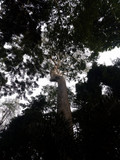School-Science-Community Triangle Initiative (SCSTI)
Duration: 2018-2022
This project aims at innovating education for sustainable development in that it reorients teaching content towards what is defined as relevant and current by the community in which the project schools operate. Schools are linked to community needs, which allows for dialoguing between different generations about current and future developments of sustainability. Thus, the project accommodates what has been called the “people-oriented development”, “owned and articulated around the socioeconomic and cultural aspirations of the people” (CESA 2016-25, p. 10-11). Consequently, education for sustainable development departs from on-site investigation instead of completing existing frameworks.
The first project phase encompassed workshops with community members of the school site in Mfou, Cameroon, including farmers, teachers as well as educational and administrative authorities. Workshops with educational and administrative authorities brought to light the pedagogical needs of the context, namely the needed practice orientation of school education. Practice orientation in this context means the linkage of teaching and learning in schools to real life problems as well as new pedagogical approaches such as inquiry-based learning, group work, field trips, critical thinking etc. The result of the workshops with farmers and other community members targeted the problem of neglected cocoa production in the region by emphasizing a need for more sustainability of cocoa production.
A team of Cameroonian and Swiss teacher educators developed together with the teachers of Lycée Classique of Mfou new and comprehensive teaching material thematizing sustainable cocoa production. Part one deals with the scientific approach to cocoa production based on newest scientific research mostly from research of Prof. Dr. Johan Six, ETH Zürich. Part two is based on new approaches to geography research, namely emotional, affective and non-representational geographies (e.g. Nigel Thrift, Caroline Schurr and others). This approach targets the everyday life of cocoa farmers, their emotional and affective linkages to cocoa production, their hopes, needs, practices and so on. Students engage with this everyday life by investigative means such as qualitative interview forms, field trips and so on. Departing from the student’s personal intensities, experiences, curiosity and emotional engagement, they design an investigative project in groups. The final conclusion is made out of the personal experiences with the farmers. A communicative event at the end of the project links their experiences back to the community.

African-European School Dialogue
Duration: 2023-2025
The project aims to bring together teachers and students within secondary school education from Cameroon and Europe to facilitate a reciprocal dialogue on how teaching and textbooks address the respective other context (teaching about Africa in Europe, teaching about Europe in Africa). As textbook analysis has shown, geography textbooks for example continue to address “Africa” from a Eurocentric perspective, whilst in some African contexts, the teaching about Europe has been completely suspended or marginalized. This leads on both sides to distorted perspectives, which can turn into socially and politically problematic ways of thinking about the other.
John W. Meyer's World Polity Theory acts as a theoretical background for critically revising reciprocal biases. A design thinking approach leads the teachers of two schools in Cameroon and Switzerland through the project. Online and onsite workshops bring teachers of two continents together to empathise with each other and the respective other context, to reciprocally work against biases and to jointly develop new teaching content and methodology. Onsite visits in Switzerland and Cameroon allow teachers to acquire experience-based learning about the respective other context.
